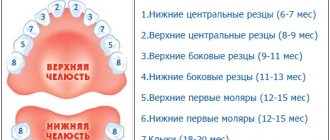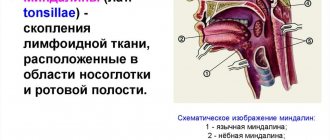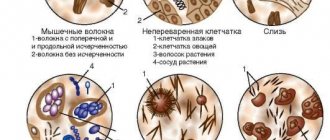Tonsils are an obstacle to pathogenic bacteria and infectious diseases that invade the human body. Frequent respiratory diseases and the ecological state of the environment undermine the health of these organs even in childhood. A child's sore throat is not always a sign of pathology. Nevertheless, one cannot ignore such a deviation either.
The nasopharynx is the first to encounter viruses and bacteria. The condition of its mucous membranes affects the child’s local immunity. Tonsils create a barrier to pathogenic microflora, preventing it from spreading lower into the respiratory tract. That is why people who have these organs removed are more susceptible to bronchopulmonary diseases.
Loose throat: pathology or not
A child's sore throat is not a diagnosis, but rather a condition. This is an excess of lymphoid tissue on the tonsils and on the back of the throat. Enlarged tonsils are a favorable environment for the proliferation of pathogenic organisms .
If such a phenomenon does not bother the child, then preventive measures will be sufficient. If at the same time there is hyperemia of the larynx and increased temperature, this indicates that an inflammatory process has occurred. The first degree of hypertrophy of the tonsils in a child does not mean that he will have problems with his throat in the future. It is not at all necessary that this is precisely the cause of frequent illnesses and that everything will soon end in chronic tonsillitis. Sometimes otolaryngologists see no reason for concern if the baby has a loose throat. The reasons are as follows:
- loose tonsils and the back wall of the throat can be a consequence of frequent illnesses, however, if the child’s local immunity has been restored and is at a high level, then this sign does not indicate any pathology;
- Enlarged tonsils may return to normal over time, as the child grows and the amount of lymphoid tissue in the body may change. The prognosis is especially favorable if the baby stops getting sick often, in particular with sore throats and pharyngitis.
Doctors emphasize the need to strengthen local immunity and harden the throat. Placing a child at home, wrapping him up and not letting him go outside is a fundamentally wrong approach in this case.
As the child gets older, the tonsil problem may go away on its own or develop into a chronic condition. That is why it is not recommended to ignore a loose throat. Even if the baby easily tolerates infections, and colds do not result in complications, it is necessary to sanitize the tonsils and treat a red throat at the slightest inflammation.
Treatment options
To begin to treat a red, loose throat, you must first determine the cause of the disease. Self-medication can provoke further development of pathology and attract a lot of complications.
If your throat becomes red, you should immediately contact your pediatrician. He will prescribe the appropriate tests: blood, urine and a smear from the affected area. They must be taken before starting drug treatment to avoid distortions in the results. Only when the answer comes, the doctor will prescribe the appropriate treatment.
Local remedies
Preparations for the treatment of throat diseases contain antiseptics and antibiotics, which have a local effect on the causative agent of the disease, but at the same time are not absorbed by the body. First aid for a red and sore throat will be sprays, gargling solutions and lozenges:
- Antiseptic spray. A local drug that helps fight infection and reduce pain.
- Inhalations. They are used only for the treatment of diseases of viral origin. It is not recommended to carry out at elevated body temperatures. The action is based on the fact that the liquid with the medicinal substance is converted into vapor by a special device. The medicine penetrates the affected tissue.
- Lollipops. Prescribed by an otolaryngologist after establishing a diagnosis and determining the type of pathogen.
- Oil solutions. The preparations are intended for direct treatment of the tonsils. They remain on the surface of the throat longer and therefore give a better effect.
How to treat a child's sore throat
We are all accustomed to brushing our teeth twice a day, because this is the key to their health. However, isn’t it necessary to take care of the health of the nasopharynx as a whole, because bacteria multiply not only between the teeth, but also on the tongue and in the throat. Loose tonsils are a favorable environment for the growth of bacteria, so keeping them clean is no less important than keeping the mouth clean.
The first rule is rinsing

This is not easy, but clean tonsils are the key to strong immunity and its health in the future. There is no need to buy newfangled medications: ready-made commercial sprays or rinses are far from the most effective remedies for a sore throat. The most effective antiseptic is regular table or sea salt . It is saline solutions that are the best:
- moisturize mucous membranes;
- kill bacteria;
- relieve inflammation.
Just pour warm water into a glass, add a teaspoon of salt, a teaspoon of soda and a couple of drops of iodine - this is the best remedy for treating a sore throat. When the throat is inflamed, this recipe can be adjusted by adding one aspirin tablet to the water - this will improve blood flow to the diseased organ.
When a child has a loose, but not red throat, this does not mean that he does not need to be treated and wait until the problem gets worse. Teach your child to gargle after eating. This will prevent food particles from getting into the lacunae of the tonsils and turning into pus.
Solutions and lozenges
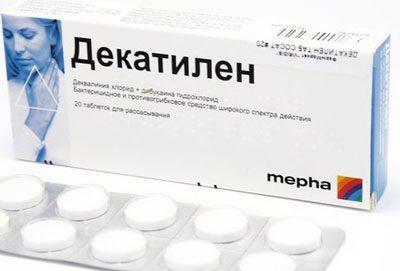
There are a lot of tablets for sore throats in pharmacies. This is exactly what you need to pay special attention to when choosing a medicine. Pain cannot be treated, it is relieved, but it is the sore throat that needs to be treated! Many drugs simply relieve pain and discomfort, but the problem of loose tonsils remains. Doctors recommend paying attention to the composition of medications. If there is a large amount of lidocaine and a minimum of plant extracts (for example, Decathylene, Hexalize, Orasept), such products are not suitable for treating a sore throat. If the composition of the tablets is more natural and natural, this is the best remedy for combating tonsillitis and loose tonsils. Lisobakt, Tonsillotren, Trachisan tablets, rinses and Tantum Verde lozenges performed well.
Preventive measures
It is important to maintain oral hygiene, because infection can develop on both teeth and gums. It is necessary to strengthen the immune system and avoid hypothermia of the child. We must remember that the infection enters the body faster through damaged mucous membranes, which means it is necessary to strengthen local immunity.
It is also recommended to ventilate the room more often and carry out wet cleaning. Crowds of people should be avoided, especially during outbreaks of infectious diseases.
Chronic tonsillitis as a consequence of loose tonsils
Hypertrophy of the tonsils is a consequence of repeated respiratory infections, pharyngitis, and tonsillitis. The tonsils increase in size, and the number of lacunae in which food gets stuck and purulent contents accumulate also increases. If a sore throat is not treated, the child will very soon develop chronic tonsillitis, which every now and then develops into a sore throat. This may eventually lead to the removal of the tonsils.
Symptoms of chronic tonsillitis
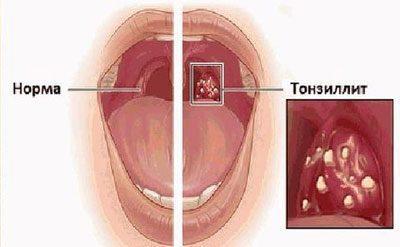
Chronic tonsillitis is a slowly smoldering infection in the throat. The disease occurs as a result of untimely and incorrectly treated sore throat. With this disease, the tonsils cease to reliably protect the body, and they themselves quickly become involved in the pathological process. Its symptoms:
- periodic soreness in the throat;
- low-grade fever up to 37.5C;
- purulent plugs on the tonsils;
- general malaise and weakness;
- hyperemia and swelling of the larynx;
- white coating on the tongue;
- slight headache;
- enlarged lymph nodes.
Symptoms of a sore throat
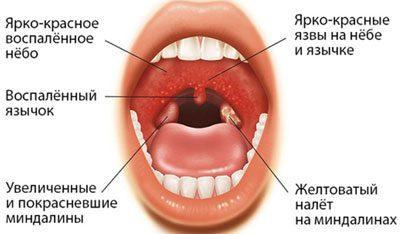
A sluggish inflammatory process in a loose throat can at any time turn into an acute stage and end with a sore throat. Most often this happens when the child’s local immunity decreases, he is in an infectious environment and in rooms with dry air. In acute tonsillitis, the following symptoms are observed:
- severe pain in the throat, making it impossible to swallow;
- elevated temperature up to 39.5C;
- huge inflamed tonsils that almost completely cover the entrance to the trachea;
- purulent plugs on the tonsils;
- general weakness.
The acute stage of tonsillitis can only be cured with antibiotics. You can be treated without them, but then full recovery will not occur earlier than in two weeks, and this threatens complications and is dangerous for the child.
Complications after a sore throat
If you initially approach the treatment of sore throat incorrectly, it can result in rheumatism and heart problems. The fact is that the immune system begins to produce antibodies against streptococci, which are often the causative agents of bacterial tonsillitis.
The immune system recognizes the work of the heart muscle and musculoskeletal system as an invasion of pathogenic bacteria and begins to fight against them. That is why people who suffer from chronic tonsillitis often develop diseases of the urinary, reproductive and cardiovascular systems of the body. They are also more susceptible to rheumatoid arthritis.
Treatment of sore throat
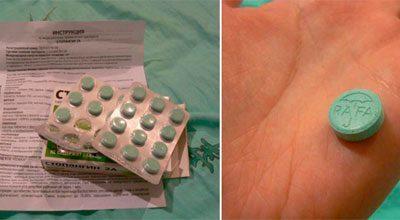
The biggest mistake in treating a sore throat and sore throat, which both parents and doctors make, is prescribing broad-spectrum antibiotics without understanding the cause of the disease. Meanwhile, sore throat can be caused by several types of pathogens:
- fungi;
- herpes virus;
- bacteria.
Treatment with antibiotics for fungal and herpes sore throat will not bring any results. In addition, such therapy can further worsen the disease. Prolonged sore throat is the main cause of a loose throat and, as a consequence, chronic tonsillitis. This is why medications can be prescribed after receiving the results of a throat smear.
Incorrect and untimely treatment of sore throat is the main cause of loose tonsils in children.
A loose and red throat, as a consequence of acute tonsillitis, is treated depending on the cause that contributed to the manifestation of such symptoms:
- viral tonsillitis - antiviral drugs;
- fungal tonsillitis - antifungal agents;
- bacterial - antibiotics.
In all of the above cases, frequent rinsing and dissolving tablets to relieve pain are indicated as auxiliary therapy..
How to cure tonsillitis
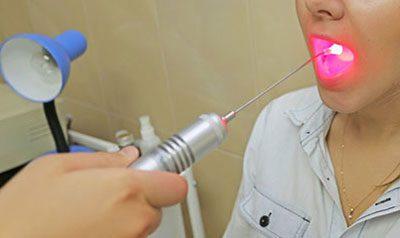
If a loose throat is a consequence of a chronic inflammatory process, this is not a death sentence at all. Modern medicine has new methods for treating tonsillitis, and some of them have proven to be very effective.
- Vacuuming is the suction of purulent contents from the lacunae of the tonsils. After the procedure, the throat is treated with an antiseptic solution with an antibiotic.
- Washing the tonsils. The procedure is carried out with a 100 ml syringe, with which the otolaryngologist treats loose tonsils with an antiseptic solution.
- Ultraviolet, laser therapy and ultrasound are local disinfecting effects on the tonsils.
The above physiotherapeutic procedures are a chance to cure and preserve tonsils. If left untreated, tonsillitis can become a direct indication for their removal. Vacuuming has proven to be the most effective. The duration of treatment is 1.5-2 months.
Surgery is a last resort. Today, doctors advocate preserving the tonsils, even if the child has a loose throat and suffers from sore throats. However, if tonsillitis takes an acute form 3-4 times a year, the tonsils have to be cut out.
Obviously, loose tonsils in a child are not a reason to panic, but parents should make every effort to prevent this condition from developing into chronic tonsillitis. Sanitation of the oral cavity and larynx, rinsing and taking appropriate medications to strengthen the baby’s local immunity will help cope with this problem. If you take all preventive measures and follow the recommendations of the otolaryngologist, your throat will be healthy.
